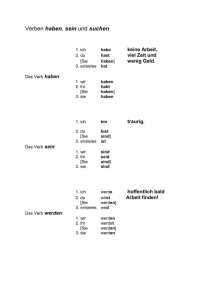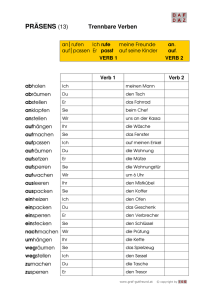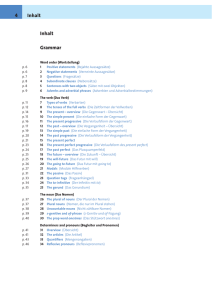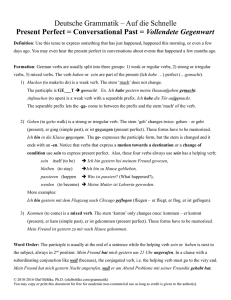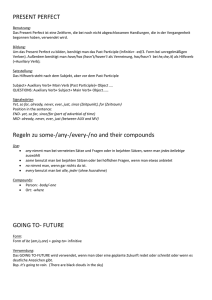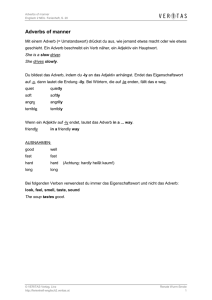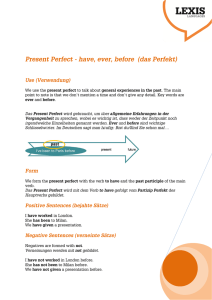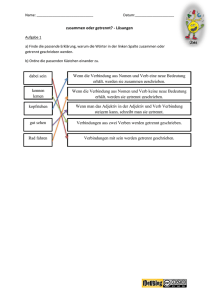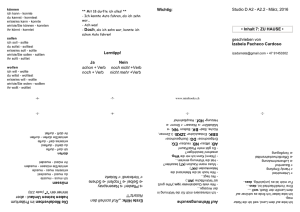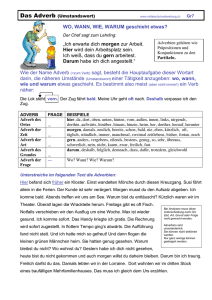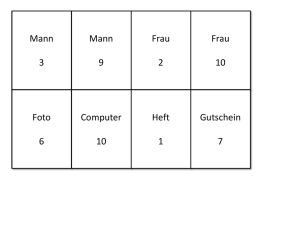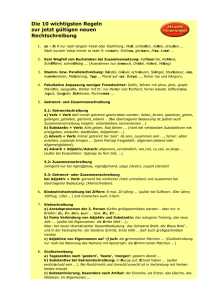Grammatical Terms
Werbung
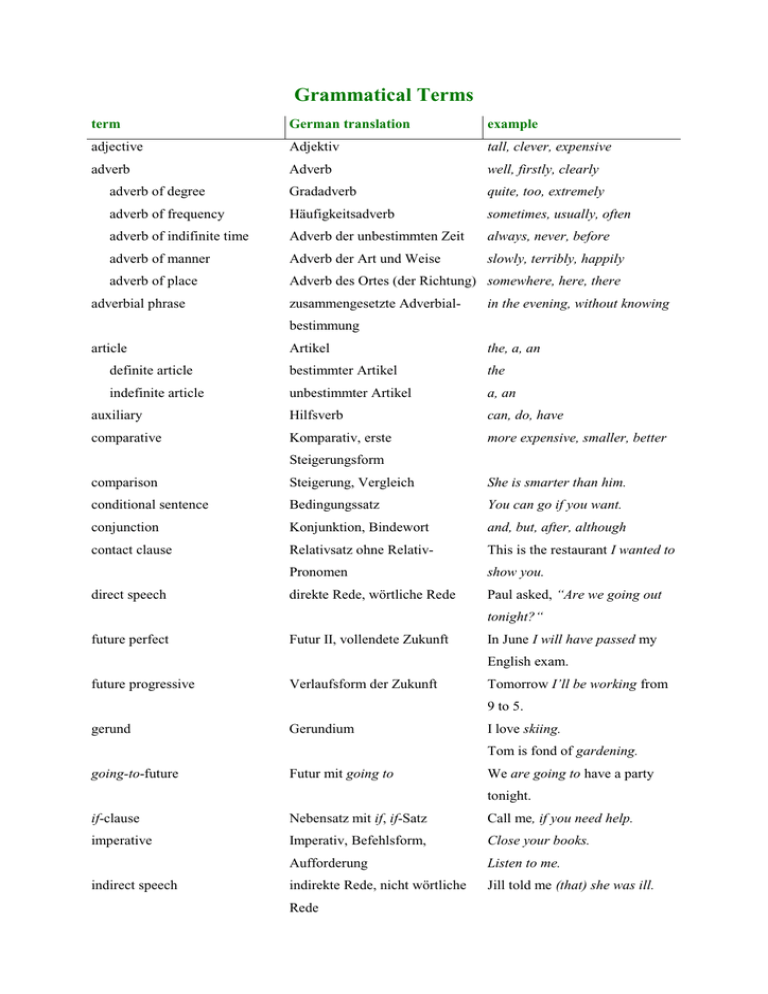
Grammatical Terms term German translation example adjective Adjektiv tall, clever, expensive adverb Adverb well, firstly, clearly adverb of degree Gradadverb quite, too, extremely adverb of frequency Häufigkeitsadverb sometimes, usually, often adverb of indifinite time Adverb der unbestimmten Zeit always, never, before adverb of manner Adverb der Art und Weise slowly, terribly, happily adverb of place Adverb des Ortes (der Richtung) somewhere, here, there adverbial phrase zusammengesetzte Adverbial- in the evening, without knowing bestimmung article Artikel the, a, an definite article bestimmter Artikel the indefinite article unbestimmter Artikel a, an auxiliary Hilfsverb can, do, have comparative Komparativ, erste more expensive, smaller, better Steigerungsform comparison Steigerung, Vergleich She is smarter than him. conditional sentence Bedingungssatz You can go if you want. conjunction Konjunktion, Bindewort and, but, after, although contact clause Relativsatz ohne Relativ- This is the restaurant I wanted to Pronomen show you. direkte Rede, wörtliche Rede Paul asked, “Are we going out direct speech tonight?“ future perfect Futur II, vollendete Zukunft In June I will have passed my English exam. future progressive Verlaufsform der Zukunft Tomorrow I’ll be working from 9 to 5. gerund Gerundium I love skiing. Tom is fond of gardening. going-to-future Futur mit going to We are going to have a party tonight. if-clause Nebensatz mit if, if-Satz Call me, if you need help. imperative Imperativ, Befehlsform, Close your books. Aufforderung Listen to me. indirekte Rede, nicht wörtliche Jill told me (that) she was ill. indirect speech Rede infinitive Infinitiv to talk, to run, to develop -ing form -ing-Form des Verbs leaving, moving, showing main clause Hauptsatz He can’t come on Monday, because he has to see the doctor. modal auxiliary modales Hilfsverb can, could, will, would, may, might modal substitute modales Ersatzverb (anstelle be allowed to, have to, be able to eines modalen Hilfsverbs) negative statement verneinter Aussagesatz I don’t have enough time. There aren’t any more questions. noun Substantiv book, glass, friend, space, time countable noun zählbares Substantiv flower/flowers, book/books uncountable noun nicht zählbares Substantiv money, water, information Objekt, Satzergänzung She is opening a tin. direktes Objekt, Sachobjekt She gave him the dictionary. object direct object I like dancing. indirect object indirektes Objekt (meist She bought her father a present. Personenobjekt) participle Partizip participle construction Partizipialfügung, Opening the door, I saw that the Partizipialkonstruktion room was empty. Passiv The book was written by an passive American author. impersonal passive „unpersönliches Passiv“ She is said to quit the job. personal passive „persönliches Passiv“ My friend had been offered a job in London. past participle Partizip Perfekt gone, helped, bought, stopped past perfect Plusquamperfekt, Jill couldn’t go to the concert, Vorvergangenheit because she had forgotten her ticket. past perfect progressive Verlaufsform des past perfect The passengers had been waiting for two hours when the train arrived. past progressive Verlaufsform der Vergangenheit While he was talking on the phone the doorbell rang. plural Plural, Mehrzahl glass/glasses, mouse/mice, foot/feet, woman/women positive statement bejahter Aussagesatz I can do that for you. He’s got a sister. possessive determiner Possessivbegleiter my, your, his, her, its, our, their (besitzanzeigender Begleiter) prefix Präfix, Vorsilbe in-, un-, re-, dis- preposition Präposition about, under, above, because present participle Partizip Präsens, Partizip I Tom is writing an article. present perfect present perfect (Perfekt, He has opened the window. vollendete Gegenwart) present perfect progressive Verlaufsform des present perfect The group has been travelling for two days. present progressive Verlaufsform des present (der Joe is reading the newspaper. Gegenwart) progressive form Verlaufsform des Verbs He’s watching television. They have been waiting for hours. pronoun personal pronoun Pronomen, Fürwort Personalpronomen (persönliches I, you, he, she, it, me, him, them Fürwort) possessive pronoun Possessivpronomen mine, yours, his, hers, ours, theirs reflexive pronoun Reflexivpronomen yourself, himself, herself relative pronoun Relativpronomen, bezügliches that, who, which, whose Fürwort prop-word Stützwort the first one and the second one quantifier Mengenbezeichnung some, any, much, a little, few question Frage(satz) Do you know where it is? question tag Frageanhängsel Paul is at home, isn’t he? Your aren’t driving, aren’t you? question word Fragewort who? what? when? how? relative clause Relativsatz, Bezugssatz That’s the man who lives next door. defining relative clause non-defining relative clause reported speech bestimmender / notwendiger The teacher who told you that Relativsatz was right. nicht bestimmender Relativsatz, Yesterday I talked to the man nicht notwendiger Relativsatz who is living next door. indirekte Rede, nicht wörtliche Michael said (that) he didn’t Rede know. s-genitive s-Genitiv my father’s car, Anne’s address simple past einfache Form der He went to the pub. Vergangenheit simple present einfache Form der Gegenwart They listen to the news. singular Einzahl, Singular pencil, event; I, you, he sub-clause, Nebensatz We couldn’t go to the cinema subordinate clause because we didn’t have enough money. subject Subjekt Anne lives in Manchester. His car is red. subject question superlative verb Subjektfrage, Frage nach dem Who gave you the book? Subjekt What happened? Superlativ, höchste highest, most interesting, most Steigerungsform carefully Verb (to) help, (to) consider, (to) develop full verb Vollverb wait, ask, laugh irregular verb unregelmäßiges Verb be/was/been; lay/laid/laid regular verb regelmäßiges Verb work/worked/worked verb of motion Verb der Bewegung (to) come, (to) go verb of perception Verb der Wahrnehmung (to) see, (to) watch, (to) listen, (to) notice verb of rest Verb der Ruhe (to) stay, (to) sit, (to) lie, (to) stand will-future Futur mit will He’ll go to France in February. yes/no question Entscheidungsfrage Can you help me? Are you from Canada?
